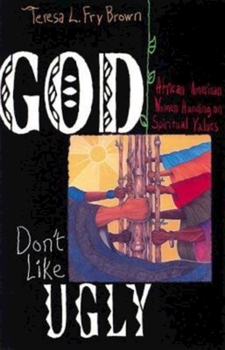God Don't Like Ugly
Select Format
Select Condition 
Book Overview
Countering dire pronouncements of the irrelevance of African American institutions, Teresa L. Fry Brown celebrates the way African American women continue, often invisibly, the task of passing on moral wisdom in African-American families, churches, and communities. The book begins with the author's analysis of intergenerational transmission of spiritual values as depicted in selected African American women's literature written since 1960 (gospel music,...
Format:Paperback
Language:English
ISBN:0687087996
ISBN13:9780687087990
Release Date:November 2000
Publisher:Abingdon Press
Length:216 Pages
Weight:0.82 lbs.
Dimensions:0.6" x 6.0" x 9.0"
Related Subjects
African-American Studies Christian Books & Bibles Church History Ethics Ethnic Studies Other Religions, Practices & Sacred Texts Politics & Social Sciences Religion Religion & Spirituality Religious Studies Social Science Social Sciences Sociology Specific Demographics Spirituality Theology Women's StudiesCustomer Reviews
3 ratings
Title Says It All
Published by Thriftbooks.com User , 17 years ago
Professor Teresa Brown's "God Don't Like Ugly" (2000, 215-page paperback) is an emergent 21st century African American woman's theology fieldbook. Originating from her black mid American (as a native Missourian) upbringing in the second half of the last century, Dr. Brown presents black "womanist" (not white feminist) God-talk. This informative book is thoughtful and well researched with 6 pages of bibliography. From the outset Brown is determined to refute "dominant white Americans" myths for the African American experience. She presents a womanist theology (which includes family, church, the Bible, and Jesus components) to preempt and prevent white scapegoating blacks. Early on, Rev. Brown questions white polling and research for black families which conclude that African Americans are measurably different and thus inferior. Her point, God loves African American- it is not ugly. Brown's is "a womanist hermeneutic of liberation for all people" (page 15). Emergent womanist theology is distinctly innovative. Brown's introduction of Jesus as "cosufferer" (p. 82) calls for broad theological reflection. Of such co-suffering she says, "black churches teach that `we are saved to save others, blessed to bless others and to be a service to others'" (page 107). This theology's maturing will be exciting to watch. Perhaps, the title of this book says it all. Brown explains that she often heard this from her grandmother (her "dominant family member") reminding "God is not pleased with negative or unattractive behavior". This book and its application herein are recommended to all.
Transmitting family values and wisdom thru the ages
Published by Thriftbooks.com User , 21 years ago
Rev. Dr. Teresa Fry Brown has written an excellent historical perspective that recalls her own upbringing and affirms the role of mothers, aunties, grandmothers and othermothers in the transmission of spiritual and behavioral values. Fry Brown integrates the ways in which women have found their individual and collective 'voice' through the genre of fictional literature, poetry,and musical composition, wherein women were able to pass along values through character portrayal. The foundational guideline for many of these transmitted values is found in the faith experience of the matriarchs, then translated into standards for the family to abide by. The rich tapestry that Fry Brown weaves with threads of folklore and faith provides rich reading for a women's group, a faith community, and for scholarly reference on the womanist tradition. The strong message is to pass on what has been passed on to us... thus the book ends with models for mentoring youth and affirming community. Worthwhile!
Mother Wit Analyzed
Published by Thriftbooks.com User , 23 years ago
Rev. Dr. Teresa L. Fry Brown asserts that African American grandmothers, mothers and "othermothers" are the primary transmitters of spiritual values in African American families, churches and communities. African American children first learn how to act from these mothers and mother figures.However, prior to the sixties, these voices have been primarily muted by others who would claim to speak for the African American community. Brown analyzes African American women's liturature (poetry, gospel songs, novels, short stories, autobiographies) to document how these grandmothers and othermothers have provided a strong, spiritually-based support system for African American families.Brown is redundant on occasion. Nevertheless, I believe that this book is a valuable resource that should be read by persons who minister to African Americans, particularly African American children.






